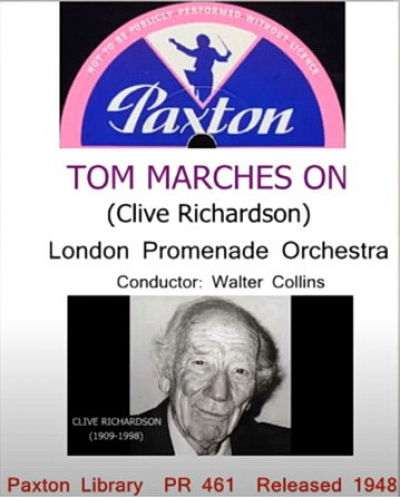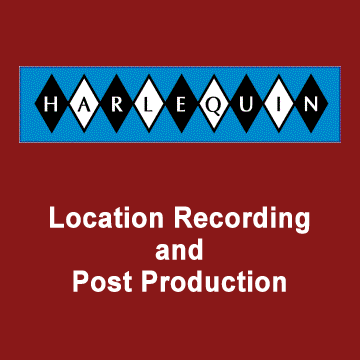Playlist 20 June 2021 |
Recording Details |
|
| Rhythm and Blues – Philip Sparke | Opening for weekly show Foden's Band MD: Michael Fowles - 2010 | 'Patrons' Choice III' - CD - Egon CD-SFZ154 - 2010 |
| Neapolitan Scenes - Jules Massenet arr. Roy Newsome | Brighouse and Rastrick Band MD: Allan Withington - 1993 | 'Aria' - CD - Kirklees Music KRCD 1012 - 1993 |
| Vista - Dean Jones - a short score available on this link - https://www.musikverlag-frank.ch/userfiles/files/pdf/BB/vista_bb.pdf | North York Temple Band (Canada) BM: Glenn Barlow - 2013 | 'Everywhere' - CD - NYTB - 2013 |
| Alpine Samba - Derek Broadbent | National Youth Brass Band of (Switzerland) MD: James Watson - 1995 | 'Anniversary' - CD - Obrasso Recording CD850 - 1995 |
| Pantomime - Philip Sparke | Euphonium Soloist Steven Mead with the Breeze Brass Band (Japan) MD: Kazuyoshi Uemura - 1993 | 'Excalibur' - CD - Kosei Publishing Japan KOCD-2503 - 1993 |
| Little Suite for Brass No. 2 op93 - Malcolm Arnold | Black Dyke Mills Band MD: Roy Newsome - 1968 | 'With Band and Voices' - Vinyl - PYE NPL 18209 - 1968 |
| Cruella de Ville - Melville A. Leven | Redbridge Band MD: Melvin White - 2003 | 'Music from the Bandstand - Movie Blockbusters Vol. 2' - CD - Compilation Fastforward Music Ltd - 2003 |
| Nabucodonosor - Overture - Giuseppe Verdi arr. William Rimmer | Grimethorpe Colliery Band (UK Coal) MD: Elgar Howarth - 2005 | 'The History of Brass Band Music -Classical Arrangements' - CD - Chandos Recording DOYCD164 - 2005 |
| Lucille - Percy Code | Cornet Soloist Jack Mackintosh with a Military Band - 1930 | 'The Cornet King' - CD - Choice Recordings Choice CD1 BM1 1994 - Originally from Regal MR274 - 1930 |
| Simplicity March - J. Ord Hume | Carlton Main Frickley Colliery Band Guest MD: William Relton - 1970 | 'Classical Brass' - Vinyl - Pye Golden Guinea Records – GSGL10454 - 1970 |
| Cry of the Mountains - Howard Lorriman | Black Dyke Band MD: Dr. Nicholas Childs - 2013 | 'Encores' - CD - Obrasso Recording CD949 - 2013 |
| The Foggy Dew - Traditional arr. Philip Doe | Leyland DAF Band MD: Phillip Littlemore - 2001 | 'East Coast Pictures' - C D - Faber Music ISBN 0571521096 - 2001 |
| One Day In Your Life - Renee Almand arr. Darrol Barry | Tenor Horn Soloist Chris Pannell with the Hammonds Saltaire Band MD: Morgan Griffiths - 2015 | 'The Eternal Quest' - CD - World of Sound - 2015 |
| Cross-Rhythms - Steven Ponsford | Amsterdam Staff Band (The Netherlands) BM: Olaf Ritman - 2020 | 'Unified' - CD - SP&S CD435 - 2020 |
| The Bride of the Waves - Herbert Lincoln Clarke | Trumpet Soloist Philip Cobb with the Central Band of the Royal Air Force MD: Wing Commander Duncan Stubbs - 2016 | 'Fantasy' - CD - SP&S CD366 - 2016 |
| Overture: Zampa - Ferdinand Herold | The Wallace Collection Brass Ensemble MD: Simon Wright - 1996 | 'The Origin of the Species Virtuoso Victorian Brass Music' - CD - Nimbus Recordings: NI 5470 - 1996 |
| Crystal Waltz - Joop Portengen arr. Edrich Siebert | Creswell Colliery Band MD: Ernest Woodhouse - 1963 | 'Brass and Voices' - 1963 |
| Canterbury Chorale - Jan van der Roost | Breeze Brass Band (Japan) MD: Kazuyoshi Uemura - 1993 | 'Excalibur' - CD - Kosei Publishing Japan KOCD-2503 - 1993 |
| Tom Marches On - Clive Richardson | Sunlife Band MD: Roy Newsome - 1990 | 'Avondale' - CD - Grasmere – GRCD41 - 1990 |
| Fanfare preceding Le peri - Paul Dukas | Enfield Citadel Band BM: Jonathan Corry - 2009 | 'Classically Enfield' - CD - SP&S -SPS256 - 2009 |
| Rhythm and Blues – Philip Sparke | Closing for weekly show Foden's Band MD: Michael Fowles - 2010 | 'Patrons' Choice III' - CD - Egon CD-SFZ154 - 2010 |
Sunday Bandstand 20 June 2021

Light Music is a much maligned area of popular music, difficult to classify and frequently hard to find in the record catalogues or on modern radio stations. Yet for some 30 years this was the music that filled the media, at the cinema, on record and over the airwaves - indeed, the BBC had an entire radio station named after it.
Clive Richardson (1908 - 1998) was the last of the pioneers of light music. He was born in Paris of English parents, studied at the RAM. He composed mostly for orchestra, though his works included a number of songs, film music, 'the hymn of praise' Salute to Industry, for chorus and orchestra and an instrumental piece. 'Three Flemish Folk Tunes' for two harps and oboe, with the musical Goossens family in mind. Especially remembered for his relaxed short orchestral genre piece 'Beachcomber' (1949) and the 'London Fantasia' for piano and orchestra, a depiction of the Battle of Britain, but also worthy of mention are Continental Galop, White Cliffs, Running of th Rails. Most notably two signature tunes 'Melody on the Move' and the one featured on our show this week 'Tom Marches On', the ITMA march, just one of many contributions to that programme by him.
He was educated at Harrow School and despite showing prodigious talent in matters musical from an early age began training to become a doctor. Wisely switching to music, he enrolled at the Royal Academy of Music, where he studied a variety of instruments, including piano, and took conducting tuition from Sir Henry Wood and composition with Norman O'Neil. He swiftly achieved his LRAM and ultimately became a fully fledged Associate (ARAM) which remained a source of great pride to him.
In 1937, he joined the Gaumont British Film Company at Lime Grove, and under the musical director Louis Levy he composed and orchestrated sections of some 100 films, in collaboration with such future greats of the light- music world as Charles ('Dick Barton') Williams, Jack ('Picture Parade') Beaver and Hubert ('Cornish Rhapsody') Bath. Seldom was a complete score composed by one person and invariably Levy took sole screen credit.
He was also involved in numerous Jack Hulbert and Will Hay comedies and may well have had a hand in Hitchcock's 'The Lady Vanishes' (1933) and Nicholas Brodszky's score for 'French Without Tears' (1939).
At the outbreak of war he immediately ceased all musical activities. Already an officer in the Territorial Reserve, he was posted to a succession of Ack-Ack Battalions and served in Coventry, Manchester and Birmingham. His experiences of the bombing in these cities and both the horrors and courage that he witnessed were the inspiration for his 'London Fantasia', a short concert work in the spirit of Richard Addinsell's 'Warsaw Concerto' (Dangerous Moonlight, 1941), and it proved to be Richardson's first popular hit (the recording with the composer at the piano accompanied by the Columbia Light Symphony orchestra conducted by Charles Williams was a best seller in 1945/46).
Also around this time he teamed up with fellow pianist Tony Lowry (former arranger with Henry Hall's dance band) to form the duo 'Lowry and Richardson - Four Hands in Harmony', an unexpectedly successful turn that toured the still-flourishing variety circuits. They made several film appearances including 'My Ain Folk' (1944) and later a series of Rank fillers, 'For Your Entertainment' (1952) featuring a performance in what must have been the tiniest studio on the lot. Two grand pianos and a troupe of dancing girls alarmingly fill the screen almost to bursting point.
The immediate post-war period saw Richardson at his most productive. In addition to the performing he was invited to work on the ITMA (It's That Man Again) radio series which featured a weekly orchestral interlude, performed by the Variety Orchestra conducted by Charles Shadwell. Uncopyrighted popular melodies, folk songs and nursery rhymes were the order of the day, and Richardson's inventive and lively new interpretations proved to be a great success. Rediscovered a few years ago in the BBC vaults, many of them were freshly recorded by the BBC Concert Orchestra and played as the centrepiece to the recent nostalgia series 'Legends of Light Music'; they stand up well to this day.
Meanwhile, in the music- publishing world, several major companies began recording works on their own labels, to provide pre-packaged music to the film, radio and soon- to-be television industries. Chappell, Francis Day and Hunter and Boosey and Hawkes began commissioning mood music compositions from Richardson. The post-war boom in light music had begun.
Among dozens of gems a handful of classics are still fondly remembered by music enthusiasts of a certain age. 'Holiday Spirit', for example, composed for the Chappell's library became the theme of BBC television's Childrens Newsreel, 'Tom Marches On' (for Paxton publishers) was the closing march in ITMA. 'The Shadow Waltz' (by a pseudonymous 'Paul Dubois') became the theme to the Francis Durbridge television series, remade as the feature film 'Portrait of Alison' (1954), while 'Melody on the Move' gave its title and theme song to a long-running music radio series of the 1940s.
Continuing to write into the 1960s and 1970s he freely acknowledged that the call for music in his style was limited in an era of pop, and he was delighted when the Chandos library recently commissioned him to compose material for a new nostalgia CD.
In l988 he received a token of recognition from his peers when the British Association of Songwriters Composers and Authors awarded him their Gold Medal for services to the world of music, a belated acknowledgement of his exceptional work in the field of light music.
Notes courtesy of Philip L. Scowcroft from his 'British Light Music' book)and other sources.



















